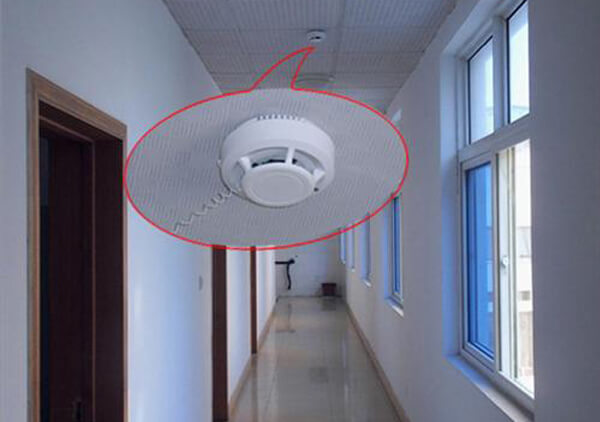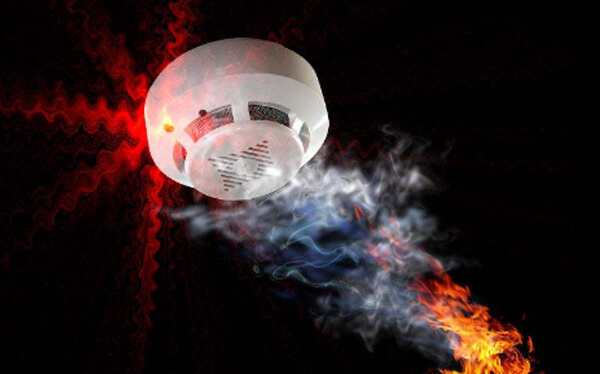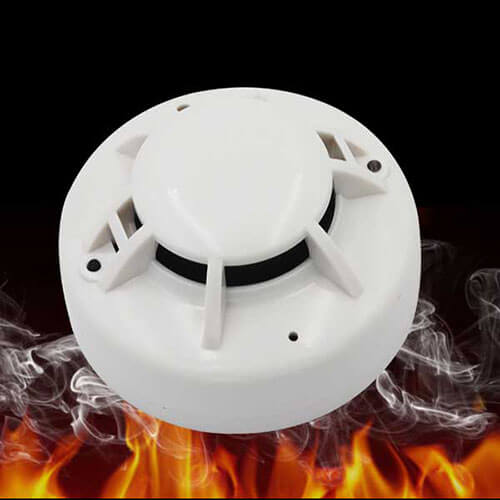Smoke from combustion is an upward motion and will quickly drift to the ceiling. The smoke alarm can detect fire through smoke. Before you see the fire or smell the smoke, the smoke detector already knows. When the alarm sounds, it beeps until the smoke clears. In a real fire it works until it is burned.
There are two main types depending on the detection principle:
- Ionization smoke alarms, which monitor fires based on the ionic changes in the air caused by combustion. It is very sensitive to the tiny smoke particles produced by combustion and is suitable for monitoring fast burning fires.
- Photoelectric smoke alarms, which monitor fires based on the scattering and absorption of light by smoke particles. It is very sensitive to the large smoke particles produced by combustion, and is suitable for monitoring smoke-heavy, shaded fires.
There are three types according to the power supply method:
- Battery-powered smoke alarms: utilizes batteries to power the device, and the batteries can be replaced.
- Hardwired smoke alarms: powered by connecting to your home’s electrical system and equipped with batteries to ensure that it works even in the event of a power outage.
- DC-powered smoke alarms: powered by 10~30V or other range of direct current.
Wired smoke alarm vs Battery smoke alarm
1. Power supply method
The difference between a wired smoke detector and a battery smoke detector is that the former is powered by the household power supply and the latter is powered by a separate battery. The mains powered one is cumbersome to wire but can be used all the way through the installation without a power cut. If your area experiences frequent power outages or measures an area where a fire would cause a power outage first, then it is recommended that you opt for a battery-powered alarm. This independent power supply may be more reliable. Today’s hardwired smoke alarms combine the two power supply methods into one, and it works steadily through the power cord when the home power supply is working properly. In the event of a power failure, the backup battery power supply is automatically enabled. It is much more reliable when faced with a fire.
2. Signal transmission
The data of the wired smoke alarm is transmitted through the signal line, so it will not be interfered by other signals in the environment, and the data supports computer and cell phone view. Battery-powered smoke detectors use wireless signals to connect to cell phones and devices, such as wifi, bluetooth and so on. Wireless signal connection is more simple and convenient. So whether it is wired or wireless connection, it is just a different way, these two ways are not inherently better or worse.
3. Installation
Wired smoke alarms need to be installed with the power and signal wires connected separately, once the wiring is wrong or not connected properly will cause it not to work. Battery-powered alarms only need to open the cover and put the batteries in accordance with the positive and negative poles. This is one of the main reasons battery powered smoke detectors are so popular in homes and offices. Even if you don’t want to take the time to read the instructions, a quick online Google search will provide you with tons of detailed videos on changing batteries. As for wired smoke alarms, it also takes time and effort to carefully read the instructions and learn the installation videos.
4. Troubleshooting
The advantage of wired smoke alarms is reflected here, because the devices in different locations are connected via RS485 signal lines. The status of all devices can be viewed through the platform, so once a device malfunctions or doesn’t work anymore, the address of the malfunctioning device can be directly locked and repaired based on the signal source. Battery-powered type and hardwired type, on the other hand, are individual devices that you need to check one by one from the kitchen to the bedroom. Rest assured that even then, the checking process won’t take much of your time.
5. Applications
Battery operated smoke alarms are suitable for use in areas with a small number of measurement points, e.g. homes, offices etc. These locations require fewer alarms and therefore take less time to install and maintain. Wired smoke detectors are better suited for multiple locations, such as multiple residential buildings, all classrooms in a school, and all stairwells in an office building. These locations have many measurements and need to be monitored centrally. All alarms can be connected together via an RS485 bus, and the platform allows the administrator to centrally view the status of devices and turn a device off or on. The platform can monitor the status of all devices and deal with faulty devices in a timely manner. Significant savings in labor and maintenance costs.

6. Safety
Wired smoke alarms use industrial grade sensors that are resistant to interference and highly reliable in multi-point monitoring programs. Battery smoke detectors and hardwired smoke detectors have been optimized with continuous technological upgrades, making them ideal for home and office locations. Responsive and low false alarms.
How to select the smoke alarm?
1. Clear needs
Smoke alarm power supply method, sensitivity, alarm method, installation method, service life and whether it has carbon monoxide monitoring function will affect your choice. So you need to clarify your needs by the installation location and the function you need to realize. Analyze the type of latent fire and select the corresponding measurement principle.
2. Brand selection
Try to choose a brand with a high volume of purchases and positive reviews, and read carefully about other consumers’ experiences. You can get this information quickly through Google, Amazon and other sites. Make the best choice by filtering and comparing. The brand’s reputation, price, quality, after-sales service and certification will influence your decision.
3. Regulations and certifications
Make sure that the smoke alarm you choose complies with local regulations and standards and has the appropriate certification. This helps to ensure that your safety equipment will work properly in the event of an emergency.
4. Power supply type
The method of powering smoke detectors has always been a major concern. Should you choose mains power or battery power? This needs to be decided by considering the layout of your measurement point, the difficulty of operation and the stability of the power supply system. You can choose the right type of power supply according to your needs.
Why is my smoke alarm flashing red?
Smoke alarms flash red, but not all fire alarms flash red. This is because some smoke detector are not equipped with a red light. Not flashing red light does not mean that the alarm is damaged. Based on the different installation environments, smoke detector brands, parameters, accessories are also different. You need to know the brand and model of the smoke alarm to be able to make further confirmation. However, as long as its red indicator light is flashing or long-lighted, it means that the smoke sensor is in working condition.
Some smoke detectors will often flash red because these alarms are usually installed on the roof. It will be more troublesome in the process of daily maintenance and overhaul, and the regular flashing of this red light can indicate the working status of the smoke alarm. If the red light flashes normally, it means that the smoke detector is working properly. Whether you rely on battery-powered or power-powered devices, if the red light is off, it means that the smoke detector is damaged or the battery is dead and needs to be replaced.

Considering the protection of hearing-impaired people, some smoke detectors have not only alarm sound but also a flashing red light to achieve the effect of double alarm alert. For hearing-impaired people, the flashing red light is more likely to make them realize the danger than the alarm sound. The red light flashes more frequently and more intensely during an alarm, making it easy to distinguish it from daily operation. For public locations or locations with a high turnover of people, installing a smoke detector with a dual alarm function is the best choice.
Why does my smoke alarm keep beeping?
1. Battery problem.
Some battery-powered smoke alarms have a power alert function, when the battery is almost dead about every minute will also sound (different models in the interval and sound will vary, but all have a low battery warning function). If your alarm is making this sound intermittently, you can replace the battery to see if that solves the problem.
2. Alarm problems.
If the alarm is too old, it will respond even if the smoke concentration is very low. So conversely, we can also determine from this if the alarm is old. That means the alarm should be replaced.
3. Dust problem.
If the smoke detector is used for too long, too much dust inside will also trigger the alarm. Then you need to consider replacing the alarm, or cleaning it. To clean the alarm, place the end of the vacuum cleaner near the opening around the alarm and vacuum it one by one. This will remove the dust from the alarm completely.
5. Sensitivity problem.
If the smoke alarm is too sensitive it is easy for false alarms to occur and go off when it detects smoke in the neighborhood. At this time you can open the windows in time to ventilate the home until there is no smoke, the natural stop.
How to turn off smoke alarm beeping?
1. Remove the smoke: Before turning off the alarm deal with the surrounding smoke and make sure there is no smoke in the environment to avoid resetting the alarm and then having it go off again. Don’t forget, if the alarm has the ability to measure other gases, make sure there is no such gas in the environment as well.
2. Turn off power or batteries: In addition to alarms due to smoke, smoke detectors may also chime due to a malfunction or false alarm. In this case it is necessary to disconnect the power supply, e.g. by stopping the power supply unit or removing the batteries. Often such abnormal alarms cannot be turned off by the alarm’s upper stop button.
3. Reset the alarm: Some smoke alarms will continue to sound an intermittent tone even after the alarm has been stopped. If this happens, try resetting the smoke detector.











